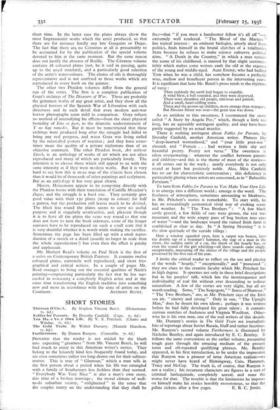SHORT STORIES
Furthermore. By Damon Runyon. (Constable. 7s. 6d.)
PROVIDED that the reader is not misled by the blurb into expecting " greatness " from Mr. Vincent Benet, he will find much to enjoy in this American writer's stories. They belong to the leisurely kind less frequently found today, and
are even sometimes rather too long-drawn out for their subject- matter. This is true of " Glamour," which a man tells in the first person about a period when his life was entangled with a family of Southerners less feckless than they seemed. " Everybody Was Very Nice " is also a man's own story, this time of a broken marriage ; the moral climate of well- to-do suburban society, " enlightened " in the sense that the couples marry on the understanding that they shall be
free—that " if you meet a handsomer fellow it's all off "—is extremely well rendered. " The Blood of the Martyrs "
has topical interest : an eminent biologist,' utterly aloof from politics, finds himself in the brutal clutches of a totalitarian State because he refuses to make science subserve political aims. " A Death in the Country," in which a man revisits the scene of his childhood, is marred by that slight sentimen- tality which makes some writers exalt the old at the expense of the young and middle-aged. Aunt Emmy, who had bullied Tom when he was a child, has somehow become a perfectly wise, mellow and beneficent person in the intervening years. It is significant that here Mr. Benet's prose tends to the rhythms of verse :
Then suddenly the earth had begun to crumble.
A wind blew, a bell sounded, and they were dispersed. There were shrunken old people, timorous and pettish, And a small, heart-stifling town.
These and the grown-up children, more strange than strangers.
But Hessian Street was over—the great tree was down. '
As an antidote to this sweetness, I recommend the story called " A Story by Angela Poe," which, though a little too long, has an agreeably astringent quality, and may have been partly suggested by an actual murder.
There is nothing astringent about Fables for Parents, by Dorothy Canfield, another American writer. Phrases like
" deep-hearted womanhood," and " your little poet-son " abound, and " Francis . . . had written a little shy and beautiful poetry. Poetry not verse." The sweetness is often overpowering : whatever the conflict between parents and children—and this is the theme of most of the stories— it all comes out in the wash ; nearly everybody is not only sound at heart but positively noble. Also, Miss Canfield has no ear for characteristic conversation ; this deficiency is particularly glaring where artists are concerned, as in " Bubushka Farnham."
To turn from Fables for Parents to You Make Your Own Life is to emerge into a different world ; emerge is the word. The freshness of atmosphere, sometimes amounting to bleakness, in Mr. Pritchett's stories is remarkable. To start with, he has an astoundingly economical vivid way of evoking scene and weather. In " The Two Brothers " : " A few black cattle grazed, a few fields of oats were grown, the rest was mountain and the wide empty pans of bog broken into eyes of water "—and the landscape round the ruined Irish farm is established as clear as day. In " A Spring Morning " it is
the slow quietude of the seaside village :
Here a window squealed open, here a carpet was beaten, here the double tap of a boatman's hammer, the step of a man in the street, the sudden rattle of a car, the throb of the hourly bus, or even the sound of the girl whistling—all these sounds came singly, exceptionally, measuring off the silence of the village and the people possessed by the first sun of the year.
I invite the critical reader to reflect on the use and placing of the words " hourly," " exceptionally," and " possessed " ; they are clues to the creative faculty which Mr. Pritchett has in high degree. It operates not only in these brief descriptions but in his peoples' talk, which has the inconsequence and individuality of real life without ever descending to tedious naturalism. A few of the stories are very slight, but all are worth reading. Some, " The Scapegoat," " Sense of Humour," " The Two Brothers," are, as Mr. Pritchett says of the Irish sea air, " sinewy and strong." Only in one, " The Upright Man," does he desert his own idiom ; perhaps it was written before he had fully developed his great talent ; it contains curious snatches of Audenese and Virginia Woolfism. Other- wise he is his own man, one of the real writers of this decade. Mr. Duranty's stories in The Gold Train are journalistic bits of reportage about Soviet Russia, bluff and rather facetious. Mr. Runyon's second volume Furthermore is illustrated by Nicholas Bentley, and again introduced by E. C. Bentley. It
follows the same conventions as the earlier volume, presenting tough guys through the amusing medium of the present tense and oft-repeated qualifying phrases. Mr. Bentley appeared, in his first introduction, to be under the impression that Runyon was a pioneer of terse American realism—we might never have heard of Hemingway, Cain, Hammett. Tracy and McCoy. The truth is, of course, that Runyon is not a realist ; his recurrent characters are figures in a sort of criminal harlequinade, completely unreal, and none the worse for that. The trouble is that the limitations he imposes on himself make his stories horribly monotonous, so that the palate sickens after a few pages. • E B. C. JoREs.
















































 Previous page
Previous page